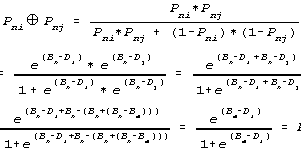Can mental testing meet physicist Norman Campbell's "concatenate heads" requirement for fundamental measurement, namely that the combination of X and Y be more than X or Y, and that X and Y concatenate to produce an X+Y result, interpretable as a physical addition operation? Campbell's concatenation follows strict rules. When a rod of length X is "added" (in a specific way denoted by Ð ) to a rod of length Y, then their combined length is X+Y, i.e.,
![]()
In psychological measurement, what happens to the probability of a right answer when two persons, m and n of abilities Bn and Bm, join forces to agree on an answer to item i of difficulty Di?
Let Pni be the probability that person n succeeds on item i. Then
also
Are two heads better than one when both are smarter than the item, i.e., both X and Y are positive, so that Pni>0.5 and Pmi>0.5? Yes, because, since they agree on the answer, the probability space is limited to both succeeding or both failing:
![]()
This consensus, "team-work", approach to problem solving is often used by committees. It succeeds admirably provided that each individual committee member has a better than 50% chance of coming to a correct decision.
Can person abilities be concatenated? Yes, because the probability that persons n and m succeed or fail on item i when combined as a team produces:

Thus the Rasch probability of a right answer when two persons work together depends on the concatenations of the difficulty of item Di with the abilities of the two persons, Bn and Bm. The relation
is a concatenation of abilities on the interval scale defined by
![]()
What happens when one person is faced with two items, i and j, combined in such a way that the person either succeeds on both or fails on both? Is the combination of two hard items harder than one? Yes, because Pni<0.5 and Pnj<0.5, so that:
![]()
Can item difficulties be concatenated? Yes, in the same way as person abilities. The Rasch probability of getting two items correct depends on the concatenations of the ability of the person, Bn, with the difficulties of the two items, Di and Dj, producing
![]()
Can item difficulties be added to equate person abilities? Yes, because, when Pni follows the Rasch model, the addition necessary to make the performance of person n on item i appear stochastically equivalent to the performance of person m on the same item i is:
1) pair up another item j with each item i for person n.
2) choose item j such that its difficulty is
3) consider for person n only those cases in which person n succeeds or fails on both i and j, the probability of success (or failure) of person n on items i and j combined becomes

i.e., equivalent to person m on item i.
Benjamin D. Wright
Rasch model derived from Campbell concatenation: additivity, interval scaling. Wright B.D. … Rasch Measurement Transactions, 1988, 2:1 p. 16.
| Forum | Rasch Measurement Forum to discuss any Rasch-related topic |
Go to Top of Page
Go to index of all Rasch Measurement Transactions
AERA members: Join the Rasch Measurement SIG and receive the printed version of RMT
Some back issues of RMT are available as bound volumes
Subscribe to Journal of Applied Measurement
Go to Institute for Objective Measurement Home Page. The Rasch Measurement SIG (AERA) thanks the Institute for Objective Measurement for inviting the publication of Rasch Measurement Transactions on the Institute's website, www.rasch.org.
| Coming Rasch-related Events | |
|---|---|
| Jan. 16 - Feb. 13, 2025, Fri.-Fri. | On-line workshop: Rasch Measurement - Core Topics (E. Smith, Winsteps), www.statistics.com |
| Apr. 8 - Apr. 11, 2026, Wed.-Sat. | National Council for Measurement in Education - Los Angeles, CA, ncme.org/events/2026-annual-meeting |
| Apr. 8 - Apr. 12, 2026, Wed.-Sun. | American Educational Research Association - Los Angeles, CA, www.aera.net/AERA2026 |
| May. 15 - June 12, 2026, Fri.-Fri. | On-line workshop: Rasch Measurement - Core Topics (E. Smith, Winsteps), www.statistics.com |
| June 19 - July 25, 2026, Fri.-Sat. | On-line workshop: Rasch Measurement - Further Topics (E. Smith, Winsteps), www.statistics.com |
The URL of this page is www.rasch.org/rmt/rmt21b.htm
Website: www.rasch.org/rmt/contents.htm